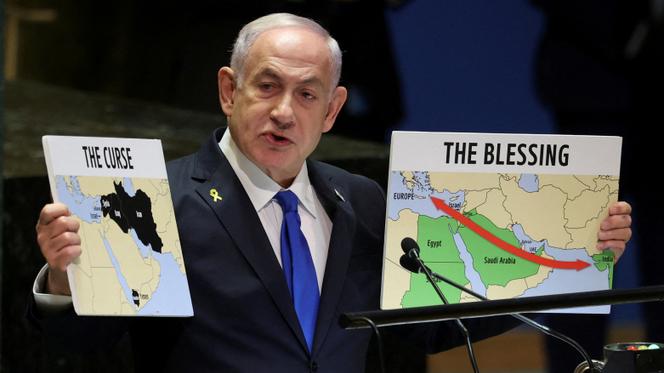


Israeli Prime Minister Benjamin Netanyahu vowed to keep striking Hezbollah and fight "until victory" against Hamas, in an address to world leaders on Friday, September 27, that defied calls for ceasefires in Lebanon and Gaza.
Hezbollah and Israel have been locked in a deadly exchange of cross-border fire since the group's Palestinian ally, Hamas, attacked Israel on October 7. Israel's aerial bombardment of Hezbollah strongholds around Lebanon has killed around 700 people this week alone, according to the health ministry, but a US-led bid for a ceasefire has failed to take hold.
"As long as Hezbollah chooses the path of war, Israel has no choice, and Israel has every right to remove this threat and return our citizens to their home safe," Netanyahu told the UN General Assembly, adding that operations against the Iran-backed militant group will "continue until we meet our objectives."
As he was speaking, Israeli warplanes carried out a series of strikes on Beirut's southern suburbs, triggering loud explosions in the capital. "Enemy warplanes carried out a series of strikes on the area of Beirut's southern suburbs," the National News Agency said. Lebanese television showed plumes of smoke rising from several locations in the area. "The IDF (military) carried out a precise strike on the central headquarters of the terrorist organisation Hezbollah in Dahiyeh," military spokesman Daniel Hagari said in a televised statement.
Nearly a year into the war with Hamas in Gaza, Israel has shifted its focus to its northern front with Lebanon, with its wave of aerial bombardment sparking an exodus of around 118,000 people. The UN children's agency has condemned the violence, saying the attacks on Lebanon were killing children "at a frightening rate." "We are witnessing the deadliest period in Lebanon in a generation, and many express their fear that this is just the beginning," the UN humanitarian coordinator in Lebanon, Imran Riza, said.
Netanyahu on Friday also addressed the war in Gaza, saying that Israel's military would continue to fight Hamas until the Islamist movement was crushed. "If Hamas stays in power, it will regroup... and attack Israel again and again and again... So Hamas has got to go," Netanyahu said, vowing to fight the group until "total victory."
The violence in Lebanon has raised fears of wider turmoil in the Middle East, with Iran-backed militants across the region vowing to keep up their fight with Israel. On Thursday, the Israeli military said it intercepted a missile fired from Yemen. The leader of Yemen's Huthi rebels, Abdul Malik al-Huthi, said in a televised address Thursday that the Iran-backed group would "not hesitate to support Lebanon and Hezbollah."
Netanyahu also took aim at Iran in his UN General Assembly address, saying: "I have a message for the tyrants of Tehran. If you strike us, we will strike you." He added: "There is no place in Iran that the long arm of Israel cannot reach, and that's true of the entire Middle East."
As conflict escalates between Israel and Hezbollah in Lebanon, the international community fears that another war could break out between the two parties, on top of Israel's ongoing war with Hamas in the Gaza Strip. But to understand the conflict, we need to go back to June 6, 1982, when Israel launched Operation Peace for Galilee and invaded Lebanon. In reaction, a militia was created in the country with the support of Iran: Hezbollah. From the beginning, the Lebanese Shiite movement declared that its aim was to eliminate Israel, and quickly established itself as one of the main enemies of the Jewish state.
Read more about the history of tensions between Hezbollah and Israel below.
